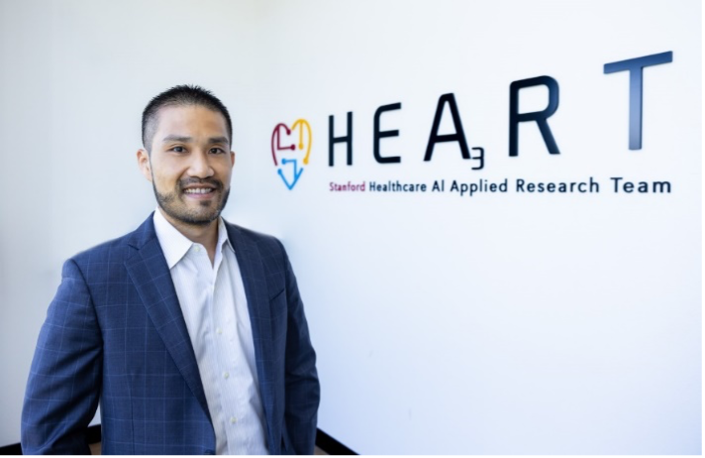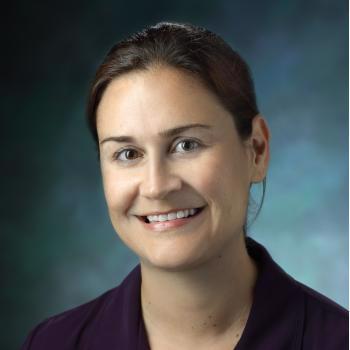|
|
|
 |
Director's Brief
Steven Lin, MD
Executive Director of HEA₃RT
Welcome! This month we are celebrating our 4-year anniversary at HEA₃RT. Fresh off of a spectacular showing at The North American Primary Care Research Group (NAPCRG), the world’s premier primary care research conference, where the team delivered 10 presentations – including the largest and most successful Artificial Intelligence (AI) Bootcamp for primary care researchers to date – we have never been more excited about the future of primary care or our mission to bring AI technologies from “code to bedside”!
Key accomplishments in 2023 include developing a new governance framework for equitable technology innovation in health and medicine with the National Academy of Medicine, as well as being among the first academic health systems in the world to implement and evaluate the use of a generative AI-powered, EHR-integrated “draft auto-reply system” to support physician-patient electronic communication and asynchronous care delivery.
In the past 4 years, we have generated over 150 scholarly works – including 30 publications and 120 conference presentations. We have mentored over 40 learners at Stanford and partnered with over 50 centers across industry, academia, non-profit, and government. Our work has been featured in the New England Journal of Medicine and JAMA, by the National Academy of Medicine, on National Public Radio, and in over a hundred news articles and interviews.
Thanks to the trailblazing spirit of our staff, faculty, fellows, residents and students, and the support of Stanford Medicine and the Division of Primary Care and Population Health, I have no doubt that the brightest days are yet to come. See what we’re working on and join us!
|
|
|
|
|
Bridging Communication and AI with the Physician Partnership Program |
|
|---|
|
This quarter’s highlight is our burgeoning collaboration with the Stanford Health Care Physician Partnership Program (PPP), led by Barbette Weimer-Elder, PhD, RN, and physician coach, alongside Lawrence Kwan, MD, a primary care physician and leader with a passion for relationship-centered care. Together, we are in the planning stages of crafting a cutting-edge curriculum aimed at equipping providers with the necessary acumen to navigate and discuss AI/ML innovations with patients, ensuring these technologies are interwoven into practice with expertise and empathy.
The PPP has been at the forefront of patient-provider communication, most notably with their Advancing Communication Excellence at Stanford (ACES) program. The ACES workshop has been a foundational educational program for clinicians, leading to a marked improvement in patient experience and clinician fulfillment. With this collaboration, the HEA3RT team's experience in AI/ML translational research is synergistically combined with PPP's expertise in program development and experience with the ACES framework, with the shared goal of integrating AI/ML curriculum into the collective educational offerings at Stanford Medicine.
To hear more, join us on December 6th from 12:45pm – 2:00pm, at the AI + Health Conference, where Barbette and Lawrence will join us as panelists in a session the seeks to explore the impact of generative AI on relationship-centered care, particularly in the context of asynchronous care.
|
|
|---|
|
Barbette Weimer-Elder PhD, RN
Director Physician Partnership Programs and Coaching Services,
Stanford Health Care |
|
|
|
Lawrence "Larry" Kwan, MD
Section Chief and Clinical Assistant Professor,
Primary Care and Population Health |
|
|
|
|
"HEA3RT's expertise in the AI/ML translational research field, along with our expertise in program implementation, curriculum development, faculty training, and evaluation will create an enriching learning experience for providers at Stanford." |
|
|---|
|
Sowing the Future of Primary Care with the AI/ML Bootcamp at NAPCRG |
|
|---|
|
With the generous sponsorship of the Gordon and Betty Moore Foundation and support from the American Board of Family Medicine Foundation, HEA₃RT celebrated a landmark moment at this year's NAPCRG annual meeting — a sold-out Artificial Intelligence (AI) Bootcamp that drew a diverse crowd of primary care researchers, clinicians, and healthcare professionals. Each attendee arrived with a shared objective: to delve into the vast potential that AI holds for primary care.
The day began with a series of expert-led discussions. Google scientist Yun Liu skillfully illuminated attendees on the foundational elements of AI and machine learning (ML), making complex concepts accessible to a non-technical audience. Mark Sendak from Duke Health then offered an inspiring look into how Duke is approaching AI/ML implementation as well as a frank perspective on the challenges and 'messiness' inherent in implementing AI/ML in real-world settings. The morning was rounded out by Marti Health Chief Medical Officer Irene Dankwa-Mullan’s thought-provoking exploration of bias and health equity within AI/ML applications, setting a high bar for the rigor that should be expected and employed to safeguard against algorithmic and implementation bias.
|
|
|---|
|
Transitioning from theory to application, the afternoon showcased the Grant Generating Project fellows who presented their AI/ML research proposals to a panel of expert clinicians, researchers, and community leaders. The interactive Q&A that followed bridged the gap between concepts and practical application, embodying the workshop’s intent to inspire actionable insights and catalyze AI/ML research and thought leadership within primary care.
The dynamic discussions and insightful presentations will extend well beyond the day as every presentation, discussion, and exchange were captured through audio and video recordings, creating a valuable repository for the creation of more broadly accessible education modules. The content will be instrumental in developing an AI/ML curriculum tailored to front-line providers, equipping providers with the knowledge and tools necessary to engage in AI/ML research and translation from “code to bedside”.
|
|
|---|
|
Affiliate Faculty Spotlight |
|
 |
Patricia Garcia, MD
Faculty
Dr. Patty Garcia is a gastroenterology clinician, educator, and health care system leader. She is the Associate Chief Medical Information Officer for Ambulatory for Stanford Health Care, spearheading efforts to lead the design, implementation, and optimization of health information technology in support of clinicians and the patients they serve for Stanford. She is also the Director of the Neurogastroenterology and Motility Laboratory for the Division of Gastroenterology and Hepatology.
Dr. Garcia has been collaborating with HEA₃RT on pioneering work to the use and rigorous evaluation of generative AI in clinical practice to enhance provider wellness, reduce burden related to the electronic health record (EHR), and mitigate burnout among healthcare teams. Projects led by Dr. Garcia include evaluation of a pilot leveraging a large language model (LLM) to generate draft responses to patient messages and use of an ambient AI digital scribe technology called DAX Copilot to streamline clinical documentation.
As a national leader in the implementation of generative AI, Dr. Garcia has presented at several venues including the Epic UGM conference and the AAMC Telehealth Committee. Dr. Garcia also helps to lead a national committee as a physician advocate for reimbursement E&M codes.
|
|
|
|
|
In the spirit of heartfelt appreciation, we shine a spotlight on Grace Hong, a Stanford graduate and founding member of our research team. After four wonderful years of dedication and groundbreaking contributions, she is embarking on an exciting new chapter, pursuing a master's in public health at Harvard. Grace's time with us has been nothing short of inspirational. As she shares reflections on her time here, we are reminded of the indelible impact she has made on our team and the broader field of AI in healthcare. |
|
|---|
|
 |
Grace Hong, BA
Research Associate
As I reflect on my time with HEA3RT, I am overcome with a number of feelings, with awe and pride to start. Over the years, the team has not only tripled in size but also grown in expertise, experience, and – pun intended – heart. We’ve evolved from testing the concept of bringing “code to bedside” through pilot studies with a handful of partners to running a large-scale randomized controlled trial assessing the effectiveness of a digital chronic disease management program, leading the implementation of an AI-enabled tool that detects inpatient clinical deterioration across the entire Stanford Hospital, and partnering with industry and community partners to improve access to dermatological information and care. In the Bay Area, where we can be quick to see innovation and technology as a silver bullet, I am proud of our team for holding firmly to the belief that technology is a tool that augments existing human processes and requires careful and thoughtful design, evaluation, and dissemination.
Above all, I am grateful for the opportunity to have grown professionally and personally with this team over the past four years. My experiences learning about broader issues within healthcare such as access to care, chronic disease management, and health disparities through various projects helped me realize my desire to pursue a master's in public health degree with a concentration in health policy. HEA3RT also gave me countless opportunities to work in interdisciplinary teams alongside some of the most diligent, thoughtful, and fun people I have come to know. While it is time to say my bittersweet goodbyes, I will take the lessons I’ve learned about research, implementation, teamwork, support, and leadership with me, and I am excited to continue following along to see all of the exciting work that HEA3RT continues to do.
|
|
|
|
|
|
December 6-7, 2023 (Stanford, California)
HEA3RT will lead a session exploring the emerging use of large language models (LLMs) in physician-patient electronic communication and asynchronous care delivery. In 2023, Stanford became one of the first academic health systems to implement the use of an Epic-integrated, LLM-powered draft auto-reply tool to help physicians manage the exponential rise in electronic patient messages. Results from this system deployment will be presented and discussed through the lens of optimizing clinical operations, advancing physician-patient communication excellence, and reducing physician burnout in the era of asynchronous care and generative AI.
|
|
|
|
|
|
December 7, 2023 (Virtual)
Dr. Lin will deliver a plenary titled, “A Fireside Chat: The Implications of AI for the Future of Primary Care” in a broadcasted interview with Susan Dentzer, President and CEO of America’s Physician Group.
|
|
|
|
|
|
December 8, 2023 (Virtual)
Drs. Shah and Tsai will be co-presenting as a part of the Society of General Internal Medicine (SGIM) Practice Redesign group with the theme of “Approaching Generative AI Use Cases in Primary Care”.
|
|
|
|
|
|
January 27th, 2024 (San Francisco, California)
Dr. Lin will deliver the keynote address at this Society of General Internal Medicine (SGIM) Regional Meeting dedicated to the theme of “Medicine Transformed: The Power of AI in Modern Healthcare”.
|
|
|
|
|
|
February 28-29, 2024 (Stanford, CA)
At this global event hosted by Times Higher Education and the Stanford Healthcare Innovation Lab, Dr. Lin will speak about the future of digital medicine and accelerating health innovation through academic-industry partnerships.
|
|
|
|
|
Recent Publications & Presentations |
|
Validation of large language AI based patient message classification to automate workflows and reduce inbox burden – American Medical Informatics Association (AMIA) Annual Symposium, New Orleans, LA. Presented November 15, 2023.
Health equity, workforce burnout and more: is generative AI the magic wand for reducing healthcare cost and improving care delivery? – Generative AI for Healthcare Summit, Cambridge, MA. Presented November 14, 2023.
The future front door of care: how generative AI will impact primary care physicians – Generative AI for Healthcare Summit, Cambridge, MA. Presented November 14, 2023.
Differences between patient and clinician submitted images: implications for virtual care of skin conditions – American Medical Informatics Association (AMIA) Annual Symposium, New Orleans, LA. Presented November 14, 2023.
Bridging the gap between community, academia, and industry to understand the utility of an AI-powered dermatology tool among everyday users – American Medical Informatics Association (AMIA) Annual Symposium, New Orleans, LA. Presented November 13, 2023.
Advancing artificial intelligence and machine learning for the future of primary care and population health – North American Primary Care Research Group (NAPCRG) 51st Annual Meeting, San Francisco, CA. Presented November 3, 2023.
Editors of family medicine journals meeting: artificial intelligence in family medicine publishing – North American Primary Care Research Group (NAPCRG) 51st Annual Meeting, San Francisco, CA. Presented November 2, 2023.
Feasibility and acceptability of a population health management tool with AI/ML risk prediction and clinical decision support – North American Primary Care Research Group (NAPCRG) 51st Annual Meeting, San Francisco, CA. Presented November 1, 2023.
Validation of large language AI based patient message classification to automate workflows and reduce inbox burden – North American Primary Care Research Group (NAPCRG) 51st Annual Meeting, San Francisco, CA. Presented November 1, 2023.
Does the photograph matter? Comparing the accuracy of an AI-based skin condition classifier on patient versus clinician taken images – North American Primary Care Research Group (NAPCRG) 51st Annual Meeting, San Francisco, CA. Presented November 1, 2023.
Differences between patient and clinician submitted images: implications for virtual care of skin conditions – North American Primary Care Research Group (NAPCRG) 51st Annual Meeting, San Francisco, CA. Presented November 1, 2023.
Artificial intelligence at primary and emergency care interface to improve care delivery – North American Primary Care Research Group (NAPCRG) 51st Annual Meeting, San Francisco, CA. Presented November 1, 2023.
Bridging the gap between community, academia, and industry to understand the utility of an AI-powered dermatology tool among everyday users – North American Primary Care Research Group (NAPCRG) 51st Annual Meeting, San Francisco, CA. Presented October 31, 2023.
Revolutionizing trial recruitment: how a quality improvement approach boosted participant engagement and enrollment rates – North American Primary Care Research Group (NAPCRG) 51st Annual Meeting, San Francisco, CA. Presented October 31, 2023.
Artificial intelligence and machine learning bootcamp – North American Primary Care Research Group (NAPCRG) 51st Annual Meeting, San Francisco, CA. Presented October 30, 2023.
Leveraging Multimodal Artificial Intelligence to Overcome Barriers to Equitable Depression and Anxiety Screening - Stanford University Department of Medicine Grand Rounds. Stanford, CA. Presented October 18, 2023.
|
|
|---|
|
Report calls for U.S. to align equity and emerging science, technology, and innovation in health and medicine – National Academy of Medicine. Published August 22, 2023.
|
|
|---|
|
Thank you for taking the time to read our quarterly newsletter! Visit our website if you would like to learn more about our work. If you would like to sign up to receive future updates from our team, please fill out this form.
- The Stanford Healthcare AI Applied Research Team
|
|
|---|
|
| |
|
|
| | |
|  |
|
|
|
|
